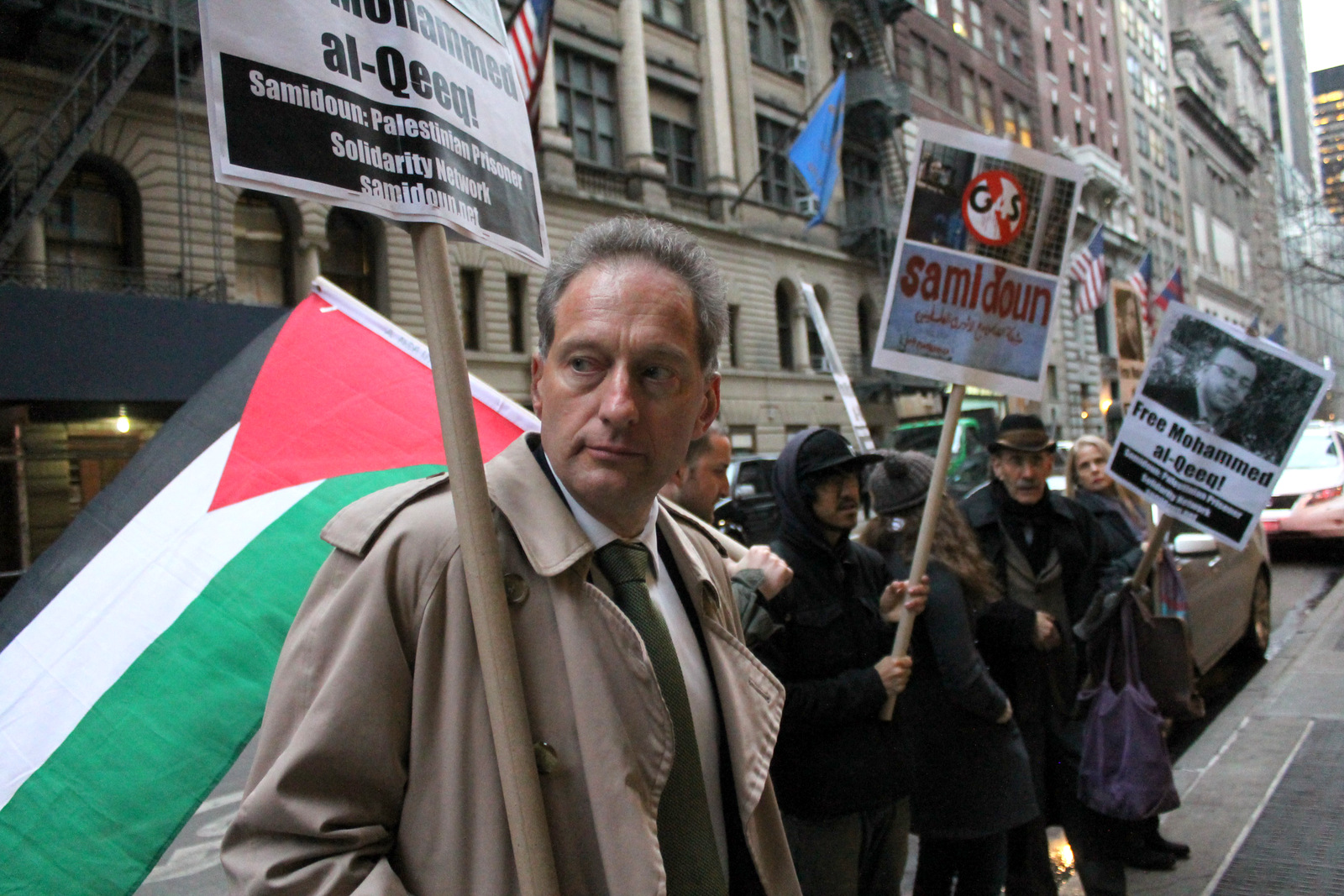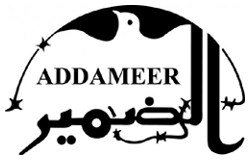
New Yorkers took to the streets on Friday, 29 January to demand the immediate release of imprisoned Palestinian journalist Mohammed al-Qeeq, on his 66th day of hunger strike and shackled to his hospital bed in critical condition. (Photo: Joe Catron/MintPress News)
NEW YORK — As Palestinian journalist Mohammed al-Qeeq reaches the 70th day of a hunger strike against his administrative detention by Israel on Tuesday, protests demanding his freedom are growing across the world as others continue in Palestine.
“Mohammed is hanging between life and death,” Islam al-Qeeq, his brother, told MintPress News from Ramallah. “The coming hours could be very crucial in his battle for freedom and physical survival.”
Supporters overseas echoed the family’s alarm.
“Al-Qeeq is facing imminent death at the hands of his occupiers,” Lisa Gagliardo, president of Students for Justice in Palestine at St. Joseph’s College in Brooklyn, told MintPress after a demonstration for al-Qeeq in New York on Friday.
Other protests for the 33-year-old father of two took place in Berlin and London, as well as various parts of Palestine, the same day.
‘If it was anywhere else in the world’
“The police had tipped the BBC off about our protest, so they had cordoned the whole area off with fencing and private security,” Innovative Minds founder Abbas Ali told MintPress about the London group’s protest outside the British state broadcaster’s headquarters.
Innovative Minds, which organizes regular protests to support Palestinian prisoners, held this one at the BBC because it had not reported on al-Qeeq’s hunger strike, Ali added.
“If it was anywhere else in the world that a journalist was tortured for 25 consecutive days for his reporting, on hunger strike for 66 days, lapsing in and out of consciousness with organs about to fail, making his last will and testament, about to die, the BBC would surely have reported it,” he said.
“But not one word for Mohammed al-Qeeq. Shameful.”
‘What G4S and its equipment makes possible’
The New York protest, part of a series organized by Samidoun: Palestinian Prisoner Solidarity Network and the group’s second local demonstration for al-Qeeq, took place outside the Manhattan office of British-Danish security conglomerate G4S.
G4S, the world’s biggest security firm and its second-largest private employer, holds contracts to equip Israeli prisons and detention centers, as well as checkpoints, military and security forces.
The company has been targeted for boycotts by the Palestinian Boycott, Divestment and Sanctions (BDS) National Committee and other civil society groups, as well as the National Palestinian Prisoners’ Movement, a coalition of prison organizations representing current detainees.
G4S “provides the security systems and the control rooms not only for the prisons which hold nearly 7,000 Palestinians, but also for the detention and interrogation centers where people like Mohammed al-Qeeq are tortured,” Beirut-based Samidoun international coordinator Chartotte Kates told MintPress.
“He was bound to a chair for up to 15 hours a day in stress positions, tortured,” she continued. “This is what G4S and its equipment makes possible.”
‘We are talking about hundreds of sit-ins’
Protests inside historic Palestine ranged from Gaza City, to HaEmek Medical Center in Afula, where al-Qeeq is currently held, to Jerusalem’s al-Aqsa Mosque, to Bil’in, where Israeli soldiers attacked a weekly protest dedicated to al-Qeeq with tear gas.
“Many activities have been held in Gaza, the West Bank, the ’48 territories, and outside Palestine to shed light on his case,” Basem Naim, a former minister of health in the Gaza-based Palestinian government, told MintPress.
Demonstrations supporting al-Qeeq continue daily across Palestine, he said.
“We are talking about hundreds of sit-ins in many cities, symbolic hunger strikes in sympathy with him, thousands of articles, TV and radio reports about him, many political activity by Palestinian factions, diplomatic contacts with embassies and international bodies calling for pressure on Israel.”
‘A practice that Israel cannot justify and must end’
The administrative detention law used to imprison al-Qeeq allows British military commanders to order the incarceration of Palestinians from the Occupied West Bank, as well as inside the internationally-recognized borders of Israel, without charge or trial.
The measure, which commanders can renew unlimited times to keep detainees jailed indefinitely, has drawn rising criticism as al-Qeeq’s hunger strike continues.
An editorial about al-Qeeq published in the Israeli newspaper Haaretz on Thursday argued, “The state should either put him on trial in keeping with the rule of law, or release him immediately.”
A day earlier, the European Union’s missions in Jerusalem and Ramallah criticized “the extensive use by Israel of administrative detention without formal charge” in a statement saying, “Detainees have the right to be informed about the charges underlying any detention, must be granted access to legal assistance, and be subject to a fair trial.”
“It is a practice that Israel cannot justify and must end,” Amnesty International said in a statement on Jan. 22. “It should release all administrative detainees unless they are to be promptly charged with internationally recognizable criminal offences and tried in accordance with international fair trial standards.”
‘A weapon and a mechanism of occupation’
These calls for a legal process to resolve al-Qeeq’s hunger strike, and the administrative detentions of around 660 other Palestinians, fall short, supporters say.
“We demand the abolition of the practice of administrative detention,” Khaled Barakat, international coordinator of the Campaign to Free Ahmad Sa’adat, told MintPress. “It is a racist, colonial law.”
Sa’adat, a prominent Palestinian prisoner and the general secretary of the Popular Front for the Liberation of Palestinian, was captured by Israeli forces in 2006. In 2008, a military court sentenced him to 30 years’ imprisonment on charges of leading an organization banned by occupation regulations.
“But he should not be sent to the Israeli military courts instead,” Barakat said. “They are nothing more than a weapon and a mechanism of occupation, a means to imprison thousands of Palestinians.”
‘A cloak of neutrality’
The International Committee of the Red Cross declined to even call for a trial, instead releasing a statement on Jan. 21 “urging both the detaining authority and the detainee to find a solution” without mentioning al-Qeeq by name.
This call, which cited the ICRC’s status “as a neutral organization,” drew harsh criticism.
“The responsibility to find a solution for imprisoning hundreds of Palestinians without charge or trial, and the responsibility for the lives of Palestinians on hunger strike rests solely with the occupier, with the Israeli Prison Service,” Barakat said. “The ICRC is hiding behind a cloak of neutrality, but it is in fact covering up for Israel’s violation of international law and any sense of humanitarian policy or justice.”
“There is nothing fair or neutral about standing aside and refusing to comment in the face of colonialism, apartheid, racism and oppression, and the ICRC’s refusal to recognize reality is neither humane nor just. It is, simply, shameful.”
‘What are they waiting for?’
Despite warnings of al-Qeeq’s increasingly dire conditions, Israel’s Supreme Court ruled against an appeal for his release on Wednesday.
Since then, his health has continued to deteriorate. On Sunday, his attorney, Jawad Boulus, called it “very dangerous. He lost his ability to speak and 60 percent of his hearing.”
“What are they waiting for in order to release my husband or look into his arrest?” his wife Faihaa asked a press conference before answering: “Until he suffers a brain hemorrhage or becomes a martyr.”
A report issued Saturday by HaEmek Medical Center confirmed al-Qeeq’s grave condition.
‘Palestinian journalists have always been on the frontline’
In a statement released through the Palestinian Authority’s Committee for Prisoners’ Affairs from his hospital bed earlier Saturday, al-Qeeq said Israel had targeted him because of his reporting.
“Palestinian journalists have always been on the frontline,” he said. “They are now experiencing forceful and abusive detention because they have been the voice of human conscience, exposing crimes and oppressive practices of Israeli occupation against the Palestinian people.”
His family and other supporters agreed.
“Mohammed al-Qeeq is a journalist, not a terrorist,” Islam al-Qeeq said. “He shouldn’t die for practicing his profession.”
Barakat added that Mohammed al-Qeeq was one of many Palestinian reporters detained by Israel.
“Palestinian writers and journalists have always come under attack and have been targeted especially by the occupation because their work exposes the truth of the racist apartheid nature of the occupier,” he said. “Mohammed al-Qeeq is in a long line of Palestinians who write and speak truthfully and face imprisonment and persecution for that.”
‘Until martyrdom or freedom’
Al-Qeeq added that he was determined to persevere until his death or release.
“When people are been treated tyrannically, they are no longer worried about the consequences even if the toll is life. Thus, I entrusted myself in God’s hands and I will continue with this hunger strike, until martyrdom or freedom.”
Osama al-Wuhaidi, a spokesman for the Hussam Association, a Gaza-based organization of current and former Palestinian detainees, told MintPress that Israeli shootings, mass detentions, and other efforts to end a Palestinian uprising in the West Bank had “hindered Palestinians from organizing proper activities to support al-Qeeq.”
In Gaza, he said, the distractions of life under siege kept local efforts from reaching their full potential:
“Palestinians are busy dealing with their daily life concerns such as poverty, the high level of unemployment, the lack of fuel and electricity, and above all the continuous Israeli blockade on Gaza.”
‘It may escalate, according to the news’
But, he added, “It may escalate, according to the news coming out of Afula hospital, where al-Qeeq is.”
Further international protests are planned this Friday in Berlin and New York, and on Saturday in Montreal, with announcements of others expected soon.
His supporters abroad hope their efforts for al-Qeeq will increase overall pressure on Israel, even after his hunger strike.
“When we highlight Israel’s brutality at an individual level, it motivates people to condemn it in higher numbers,” Lisa Gagliardo, of the St. Joseph’s’s College chapter of Students for Justice in Palestine, said.
Islam al-Qeeq said his family hoped protests would spread and draw wider participation: “We call on all people of conscience, honest and freedom-loving people to do their utmost to save Mohammed from what seems like an imminent death.”




